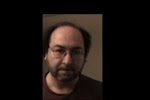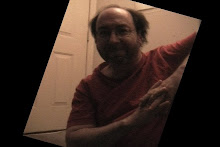A brand new thought has occurred to me, and like many of my brand new thoughts, it might actually have been 42 years in the making, five seconds here, two seconds there, it all adds up to real time spent. Sort of like only thinking about pancakes once a week, because that's how often you have them. Yes, I am going to attempt the impossible: a hypothesis about the Beatles song, "I Am The Walrus".
First, matters of comparatively lesser importance (come to think of it, if my upcoming hypothesis has any validity, there are few matters in the world with greater importance - this may be an exaggeration prompted by a momentary enthusiasm).
Matter of lesser importances number one: my DVR crashed, which means, I saw neither Letterman nor Conan on Friday, July 17th, as my plan had been to watch them on DVR after they aired. Those who have been following my blogs might consider this a matter of potential significance - I cannot say, as I haven't seen the shows I missed(!). I will point out that something that occurred on the Thursday, July 16th Conan related to what I blogged on July 15th, 4am in relation to Conan: I blogged the idea that there is danger in sports if a ball comes at you with great velocity (in the instance I cited, danger to Conan's sidekick, Andy Richter). And so on the July 16th Conan, Venus Williams hit a tennis ball "to" Conan, Conan garbed in a catcher's mask and talking about the danger he was in from the ball coming at him at a great velocity. The following night, July 17th.... I don't know what happened on Conan, or Letterman.
My DVR has since been replaced by AT&T (all recorded shows gone), though who knows what might have made it happen in the first place? I use the word "might", and thankfully no one likes hypotheticals, and so therefore I can leave behind the "whole thing" now that the DVR has been replaced.
Next, I finally got around to seeing the Will Ferrell movie, "Semi-Pro". I've often been an influence on what Will Ferrell does (including the night of his farewell from SNL), and this movie is no exception. I will let this videoclip speak for itself (enabled to do so by all the printed words I've worked into it):
Well, it almost speaks for itself. I should add that, while the student film "Limbo" referred to in this videoclip was a film class project, wherein 15 or so people made various contributions in various ways, the scene shown here was by me, guided by the basic plot of the pre-written story our class used, but mine nevertheless.
This next videoclip regards the now-cancelled TV show, "Dirty Sexy Money," the last few previously un-aired episodes of which are now being shown on ABC. This TV show, like many other show biz product, has in the past made inside-references to my work. The thing of particular interest is that (the late) Bill Clayburgh, the father of one of its stars, Academy Award winning actress Jill Clayburgh, was my next-door neighbor in New York City during most of the '80s and early '90s, and appears in my Dostoyevsky video. In presenting this videoclip, I also offer you not one link but a second link as well to videoclips showing other times when this TV show made inside-references to my Dostoyevsky. So now the latest (though originally intended for airing around Thanksgiving 2008, apparently):
And now on to The Beatles. Specifically, as promised, I offer my hypothesis about the Beatles (Lennon basically) song, "I Am The Walrus". To do so, I feel I must first attempt to dispel the notion that if Lennon himself says the words to the song are all nonsense, therefore it's all nonsense. I use as my example to illustrate this another Lennon claim that one should take with more than one grain of salt. With regard to his album, "Double Fantasy", Lennon on the one hand explained that album title as being in connection with a planned follow-up album to be titled, "A Heart Play" - from a fantasy to a play. The strict meaning of the words "Double Fantasy" are about two people and fantasy, fantasy being a word one associates with an act of the imagination. Two people are on the cover, John and Yoko, pretending (as in "fantasy"), to be unassociated individuals waiting for a traffic light, and then suddenly kissing (by the way, in 1974 a close friend of Lennon, Howard Smith, once suggested to me that in New York City I could just start up a relationship with a woman while standing next to her waiting for a traffic light. Howard was amazingly gregarious). Yet Lennon also claimed that the album was named after a flower (when translated) called, "Double Fantasy". I dispute this - not the existence of such a flower name, but that this explanation provides the entire meaning of the album name. No doubt the flower name first put the idea in his head. However, I argue that if someone with the last name of Smith gives their son the first and middle names of George Washington, and then someone named Jones does the same thing, but claims their son was named after George Washington Smith, Mr. Jones would certainly have to accept that, as far as everyone is concerned, he can say this all he wants, just the same George Washington Jones has been named after George Washington, period, and if he didn't see this happening as the consequence, well, he had to see this happening as the consequence.
Lennon could not possibly have been oblivious to what he was communicating, in terms of the non-flower aspect to the sound of the name, "Double Fantasy". When he said otherwise to an interviewer, I'm sure he had his reasons, but the final truth of the matter must certainly be different.
Perhaps he wished to bring to the table the idea that an artist's private concept regarding what is behind his own decisions for his work, or what are perceived as his private concept, does not necessarily become the prevailing concept. I furthermore believe this to be the kind of larger statement Lennon enjoyed making, and if I took the time could find many ways to prove this point about Lennon. A Beatle gets used to doing things that require another to take it from there.
As a songwriter Lennon was something of a poet as well, and a poet should not always be held responsible, after the creation of a work, for knowing exactly what prompted what. McCartney said on Letterman just the other night that other people know his history better than he. There are times when another person is in a better position than ourselves to document our actions. I would not want to be my own spokesman if I had just had a fifth of whiskey (in truth I do not drink at all, a glass of wine a year perhaps).
And thus ends my attempt at dispelling the idea that Lennon and only Lennon should have the last word on whether "Walrus" was all nonsense.
"I Am The Walrus" includes, among other things, options about identity. There is both the idea of being someone with the identity of a cog in the corporate wheel, and becoming the target of reproaches from a twisted corporate mentality for not fitting in. There is the idea that an Edgar Allen Poe also becomes a target. There are those who become faceless through their identity, eggmen and policemen and penguins. This song is an example of how an artist might be influenced by a subject he already touched on in song: "Paperback Writer," created shortly before "Walrus," also discusses the idea of finding an identity/position in the world (just as the line in the Beatles' "Golden Slumbers," "Once there was a way to get back home," is not unlike the dominant subject of the song, "Get Back," both created during the same general period).
My 1965 story, "Endless Voyage," described in my previous blog and elsewhere, and which I contend led to a number of Beatle songs (including "Paperback Writer") and began my lifelong importance in relation to the individual members of The Beatles, ends with the underwater civilization building a monument to the first underwater people. It is as tall as the Empire State Building, which was the tallest building in the world at the time I wrote it. However, because the monument has its foundation beneath the sea, it only rises a few feet above the water. In "I Am The Walrus," Lennon writes, "semolina pilchard climbing up the Eiffel Tower". No one before this song had ever heard of "semolina pilchard", however, semolina is a pudding, and pilchard is a type of sardine (usually fed to cats). So you have sardines, i.e., underwater animals, climbing the Eiffel Tower, an architectural structure often thought of as being part of the same special, very small category as the Empire State Building. Furthermore, "Endless Voyage", by being about sending half the human race to live underwater as the solution to overpopulation, is not so far from the colloquial use of the word "sardine" to denote people when they're being crammed together. Additionally, walruses and penguins are also sea creatures. If my contention about the handful or so of other Beatles songs is correct, that they built upon material in my story, "Endless Voyage," it would greatly increase the likelihood that a Beatles song with various sea creatures also followed suit.
Initially I had understood that part of the reason behind Lennon's "Walrus" was "The Walrus And The Carpenter" from "Through The Looking Glass" by Lewis Carroll, where the walrus eats the babies. A poet putting the word "egg" so near to the word "walrus" may actually have been, consciously or unconsciously, influenced by Carroll's writing, among other things. Yet are we willing to hypothesize that Lennon would write a song influenced by words from an author? Lennon never dictated that we think this, and that fact will always be "all she wrote" for any number of people. I think Lennon might also have had a special willingness to offer support, under certain circumstances, for those in situations requiring them to swim against the tide.
Subscribe to:
Post Comments (Atom)


No comments:
Post a Comment